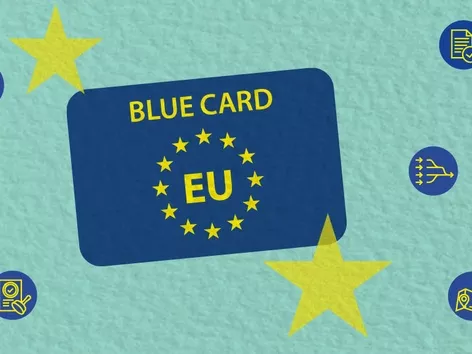Working in South Africa: The country has introduced a points system for work visas and a new permit for digital nomads

The Republic of South Africa plans to introduce significant reforms in its visa policy aimed at attracting more skilled professionals and tourists. Find out which rules will simplify the process of obtaining work visas and allow remote workers to get a job in the country
On October 9, 2024, South African Interior Minister Leon Schreiber announced important changes to the country's visa system. In particular, the state developed a scheme for obtaining work visas based on points and approved a new permit for remote workers. These changes are aimed at attracting foreign specialists and investors.
We talk about the new migration policy of South Africa in this article.
Points system in South Africa for highly qualified professionals
Reports suggest that South Africa's new point system for work visas is designed to reduce corruption and improve the efficiency of permit processing. It will provide a clear way of assessing applications to facilitate the permit process.
The Ministry of Internal Affairs outlined specific criteria for applicants. To obtain a critical skills work visa, an applicant must:
- Meet all established requirements for obtaining a visa.
- Reach the threshold of 100 points.
How will points be calculated for obtaining a visa for skilled workers?
A candidate applying for a work visa to South Africa must score the appropriate number of points according to the following criteria:
1. Qualification: holders of a master's degree or a doctor's degree - 50 points, a bachelor's degree or a diploma of advanced training - 30 points.
2. Salary Level: Above ZAR 976,194 ($55,890) gross salary per year - 50 points, between ZAR 650,796 ($37,300) and ZAR 976,196 ($55,890) per year - 20 points.
3. Work experience: 5-10 years - 20 points, more than 10 years - 30 points.
4. Employer status: availability of an offer from the Trusted Employer Scheme Company – 20 points.
5. Knowledge of language: knowledge of at least one official language of South Africa - 10 points.
Applicants not covered by the Trusted Employers Scheme must have a gross annual income of more than 650,796 Rand ($37,300).
In order to safely move, travel or work in a new country, you will need health insurance. You can issue an extended policy on our website using the link.
Why did South Africa decide to change the work visa procedure?
The Republic of South Africa is experiencing an acute shortage of workers. In particular, the skills shortage remains one of the biggest problems for the country's economic growth, second only to power outages.
At the same time, according to local media, foreigners with job offers in South Africa have to wait months or years for visas and are sometimes denied without any explanation. The old system of issuing a work visa to South Africa faced the following problems:
1. Long application process
The general work visa process was notoriously slow, with red tape often delaying submissions. The involvement of many government departments, including the Ministry of Labour, which had to check whether a suitable candidate from South Africa could fill the position, resulted in long processing times.
2. Inconsistent criteria
Applicants faced unclear and inconsistent requirements, leading to confusion and rejection of applications. Employers also found it difficult to navigate the system, especially when they demonstrated that local recruitment efforts had failed.
3. Emphasis on local labor
Strict requirements to confirm the absence of local candidates deterred both employers and foreign workers from obtaining this visa.
4. Limited flexibility
The old system had little scope for flexibility, particularly for highly skilled workers who may not have a job offer but are still valuable to the economy. The visa also did not consider applicants who may have significant work experience or qualifications but no employment prospects.
The introduction of the scoring system is a direct response to these challenges. By moving towards a more structured and transparent approach, the government of the Republic of South Africa aims to streamline the visa process and attract the right personnel to develop its economy.
Read about the peculiarities of the South African labor market and the requirements for obtaining a work visa in this article.
Visa for remote workers in South Africa
South Africa has announced the launch of a remote work visa that allows high-paid individuals working abroad to live and work in the country. These visas are designed to attract digital nomads or individuals who work in industries that allow work to be done regardless of location.
The main advantages of a remote work visa:
- Work flexibility: individuals can continue to work for their foreign employer while living in another country.
- Boosting the local economy: remote workers spend their income in the host country, contributing to the development of tourism, housing and other local businesses.
- Minimal impact on the labor market: because remote workers work abroad, they do not compete with the local workforce.
Detailed conditions and requirements for digital nomads are not yet known.
Where to apply for permits?
Applicants must submit all work visa applications through authorized South African agencies and embassies abroad. The authorities will evaluate these applications against a new points system to ensure that applicants meet the updated eligibility criteria.
The changes to South Africa's immigration laws are part of broader reforms to boost the country's tourism sector and position South Africa as an attractive destination for foreign investment.
We will remind you! The Kenyan government has announced the approval of a new work permit aimed at attracting digital nomads. This initiative will give expats a unique opportunity to combine work and exploration of the wonders of this magical African country. We have already talked about the basic requirements for obtaining a Digital Nomad Visa in Kenya and why you should move to the country.
Ihor Usyk - head of Visit World's legal department
Products from Visit World for a comfortable trip:
Checklist for obtaining a visa and necessary documents of South Africa;
Legal advice issues in South Africa;
Travel insurance for foreigners in South Africa;
Medical insurance all over the world.
Frequantly
asked questions
How can a foreigner get a work permit in South Africa?
How long does it take to get a work visa in South Africa?
Do I have the right to work in South Africa?
Recommended articles
2 min
Work
Job in Netherlands for expats: labor market, prospective vacancies and conditions
The Netherlands will experience an acute shortage of highly skilled professionals, with the largest number of vacancies available in the country in the healthcare, finance, industry and IT sectors. Find out what a foreigner needs to be employed in the Netherlands
11 Oct. 2024
More details2 min
Work
Blue card in Croatia: registration requirements and new rules in 2024
A blue card is a work permit that is the basis for employment of highly qualified workers in one of the EU countries. Find out what requirements for obtaining a permit are relevant in Croatia in 2024 and what changes to the migration legislation were recently approved by the country's leadership
10 Oct. 2024
More details1 min
Work
Post graduate work permit Canada: the country introduces new criteria for obtaining a document
The other day, the Canadian government released information that the country plans to introduce major changes to the Post-Graduate Work Permit Program (PGWP). Find out what will change for students and expats from November 1, 2024
11 Oct. 2024
More details1 min
Work
Saudi Arabia launches insurance policy to protect foreign workers: what will change for expats?
Saudi Arabia is working to create ideal conditions for the employment of expats in the region. In particular, the country's leadership plans to introduce an insurance policy to protect the rights of foreign workers. Find out what risks the policy will cover
12 Oct. 2024
More detailsAll materials and articles are owned by VisitWorld.Today and are protected by international intellectual property regulations. When using materials, approval from VisitWorld.Today is required.
